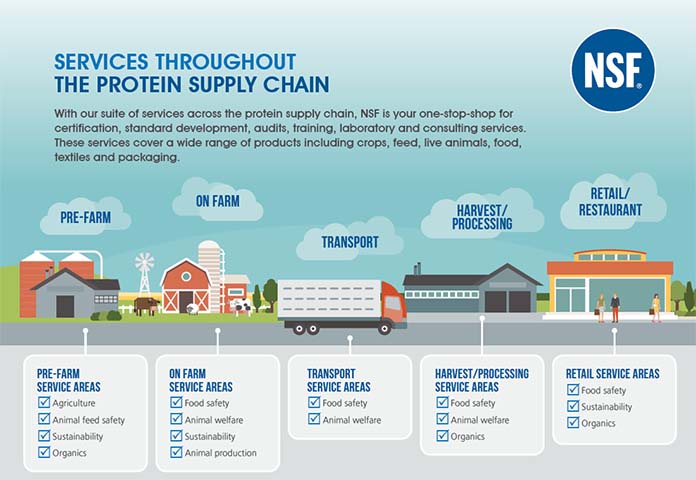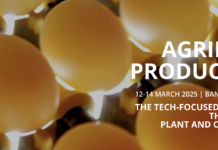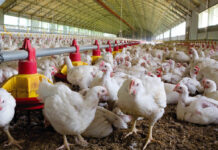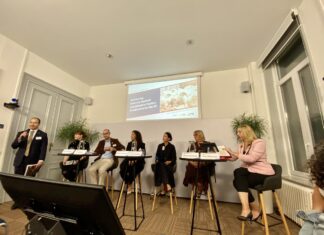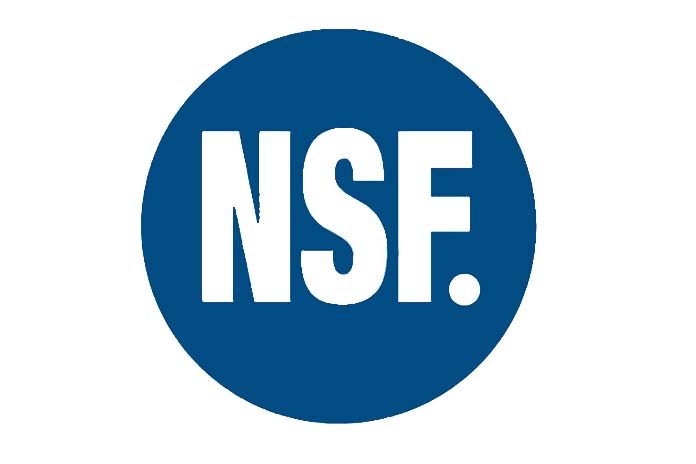
NSF Global Animal Wellness Standards are a key component of the comprehensive animal wellness services provided by NSF International, which include testing, sustainability services, claim verifications and, separately, training and consulting.
NSF International, a global public health and safety organization known for food safety and quality, launched new Global Animal Wellness Standards to address the full lifecycle of all key species and establish best practices for how animals are kept, raised and responsibly managed. The standards are the first of their kind in establishing a universal approach to animal health and wellness.
As the food industry becomes increasingly attuned to consumer and investor expectations and the high demand for transparent animal welfare practices, it’s becoming imperative for organizations to define, implement and measure proper management systems for animal health, welfare, handling and care.
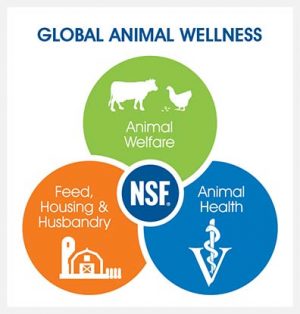 NSF Global Animal Wellness Standards establish best practices by benchmarking against global animal welfare regulations and domestic animal welfare regulatory requirements, industry standards and codes of practices. Inspired by the Five Freedoms of Animal Welfare and consistent with the International Organization for Standardization (ISO) and World Organisation of Animal Health (OIE) guidelines, NSF Global Animal Wellness Standards establish clear criteria to verify robust animal wellness management systems for beef and dairy cattle, poultry (including egg-laying), small ruminants and hogs. The standards are globally applicable, as they account for variability in regulatory requirements and variations in consumer pressure. Key areas include:
NSF Global Animal Wellness Standards establish best practices by benchmarking against global animal welfare regulations and domestic animal welfare regulatory requirements, industry standards and codes of practices. Inspired by the Five Freedoms of Animal Welfare and consistent with the International Organization for Standardization (ISO) and World Organisation of Animal Health (OIE) guidelines, NSF Global Animal Wellness Standards establish clear criteria to verify robust animal wellness management systems for beef and dairy cattle, poultry (including egg-laying), small ruminants and hogs. The standards are globally applicable, as they account for variability in regulatory requirements and variations in consumer pressure. Key areas include:
- animal sources, health and safety;
- design, maintenance and protection in animal environment, facilities and equipment;
- animal handling, husbandry and management commitment to animal wellness culture;
- feed and water.
Developed by NSF International, the Global Animal Wellness Standards were reviewed by an independent panel representing industry, academia and regulatory authorities. Technical experts from Canada, the U.S., the UK and South America were selected for their expertise including Dr. Temple Grandin, a Colorado State University animal science professor and livestock consultant. Dr. Grandin directly contributed to the review of the NSF Religious Slaughter standards, a component of the Global Animal Wellness Standards.
To achieve compliance, a facility must establish, document and implement an animal welfare management system. The standards have three tiers so there is opportunity for specifying customers to bring suppliers on board at the baseline, but encourage growth and development to achieve higher levels of compliance. The baseline level provides an entry point for farms or facilities in developing markets where practices have not yet been formalized. The next tier is “assurance” and provides specifiers with confidence that suppliers are operating with best practices in animal wellness. The third and highest tier is “certification” which demonstrates total commitment and compliance. All levels require independent audits to verify compliance and include zero tolerance for animal abuse, mistreatment or neglect.
“Animal welfare is an issue that impacts the agricultural and food production industry across the globe,” said Robert Prevendar, Global Managing Director of Supply Chain Food Safety at NSF International. “NSF International’s Global Animal Wellness Standards are designed to be relevant in every country, region and market. The standards ensure specifiers, facilities and producers that a strong, consistent animal wellness system is instituted wherever animals and animal products are sourced.”
NSF International is an independent, global organization that facilitates standards development, and tests and certifies products for the food, water, health sciences and consumer goods industries to minimize adverse health effects and protect the environment. The company provides expertise and accredited food services across all supply chain sectors, including agriculture, animal feed and welfare, produce, processing, distribution, dairy, seafood, quality management software, retail and restaurants. Services include Global Food Safety Initiative, foodservice equipment and non-food compounds certification, HACCP validation and inspection, label claims verification and certification, DNA and food package testing, product and process development, and organic and Certified Transitional certification through Quality Assurance International (QAI).
